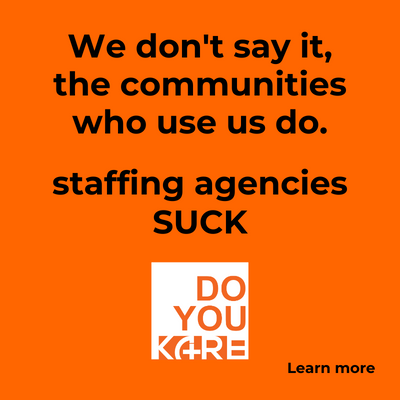The caregivers are exhausted, tense and continually thinking about finding another job.
For as long as I can remember Walmart, the place everyone likes to shop because of low prices, (I know not everyone) has endured perpetual criticism for taking advantage of workers at the low end of the spectrum (perhaps even a fair complaint) then a few days ago I received this email:
I just read an article of yours published 26 March 2013 titled: “If your staff turnover rate is average, you’re doing a terrible job”. This article has more meaning to me today as my daughter has been working at a medium sized AL community as a caregiver for almost 6 months. This community is owned by a good sized regional operator.
In this article, one of the bullet points was: “You have to pay a decent wage and provide adequate benefits. It is true that studies are universal in demonstrating that pay is not the biggest motivator yet, if you provide substandard pay you will only get and keep substandard employees”. We all know that the caregivers are the up-front representation of the company who have the most contact with residents. A heavy turnover of caregivers gives every resident a bad taste.
Apparently this is one company that hasn’t gotten the message.
But let me ask, “What is a decent wage”?
In this company, they hire caregivers at minimum wage. They schedule shifts so no one can get enough time to be considered in any way full-time. There are no benefits. Most are single women who need a job badly. Even with no benefits, there is not enough work time or pay for these employees to be able to get their own health insurance.
The daytime caregiving staffing ratio is 32:1. Many of these people may need only minimal care, but assisting dressing and toileting even half of them before breakfast (which the caregiver also serves), and then begin the bathing routines puts a real time squeeze on the caregivers. The caregivers are exhausted, tense and continually thinking about finding another job. They enjoy working with the residents but management seems to have no problem with hiring more and more desperate job-seekers to replace the more and more who keep quitting. And they wonder why residents leave as well.
This place gets good market rates for their rooms and services so it’s not as if they can’t afford to treat the caregivers better. From my perspective, there’s far too many of these kind of employers in the senior living industry and their treatment of these hands-on employees ends up being bad PR in the long run. (Bold and Link mine)
I will confess this was a pretty discouraging email to receive about an industry that I love. It is hard to fathom having a cadre of line staff “living with” (or more accurately barely surviving) in a state of constant job and income insecurity. How can they possibly do a bang up job of caring for residents. I am not quite sure how to respond to his email because it is a question that embarrasses me. How would you answer his email? Steve PS: I would also note there are companies that are doing it right and I have written about several of them. Here are two: Would You Give Your Company Away to Your Employees? Is This Any Way to Run a Senior Living Company?
If you like this article (or even if you don’t) it would be a great honor to have you subscribe to our mailing list HERE



![Restoring Trust to Senior Living [Senate Hearing]](https://www.seniorlivingforesight.net/wp-content/uploads/2018/11/news-2-440x264.jpg)





This is just horrible. most caregivers that I have had the pleasure of working with are” angels” and deserve so much more than minimum wage. This is one of the reasons that the unions have come around. Companies like this can bring down the whole industry.
Unfortunately, a “decent” wage would nick the profits of these mostly for-profit AL communities which are bottom-line driven. I’ve seen this scenario played out in some of the most attractive, expensive AL communities in the Bay Area and it feels morally wrong, although the stockholders would disagree. In San Francisco, minimum wage workers have to commute from far away to work here, double up on living conditions, or just leave the city . . . and it’s only getting worse. But back to the scenario you described with our frail population – it just begs for more regulation but who wants that? Our elders don’t need a constantly fluctuating staff and the staff needs motivation to stay beyond the “good” that they are doing. The monthly fees that are charged demand well-trained, decently-paid staff so everyone wins. It is costly to a company to have constant turnover, so they lose, too. Too bad that the only way to reach these companies to do the right thing is through regulation, but what else will motivate them?
Paul I had not really considered the union implementation, it is a great point. These kinds of things are terrible and only bring trouble to everyone.
I have met some of the leaders of this organization I don’t have any kind of a relationship with them, but it hints at the idea that being in the senior living business is only about the money. While money and profit are important, they are clearly not the only thing. And over the long term I think being focused on the bottom line is counterproductive to getting the very best bottom line.
Reducing profit is the age old excuse for not increasing wages. Staff, or labor costs are seen as the single greatest cost of operating an ALF.
The reality is, if ALFs were to pay a fair wage, then the turnover would be reduced, the cost of hiring which includes background checks, health checks, tb tests, training, etc. would be reduced. Life satisfaction for employees would increase. Attendance would increase as call ins decreased. Staff would provide better care, therefore the census would be maintained or increase.
Until ALFs understand that, and put it into action the scenario described above will continue to play out.
What is a fare wage? An amount that will vary depending upon the cost of living in the geographical location of the facility. An amount that will cover the median cost of housing, the median cost of living, allow for transportation, allow for some percentage of savings.
Until we value our elders, and those who care for them, as much as we value our profits, this situation will continue.
Unions can be part of the answer, but union dues are a significant factor, as well.
We say we don’t want federal legislation with regard to ALFs, no federal oversight, keep it at the state level, yet we don’t work together as a unit to see that cirucmstances are changed to improve the quality of life for both residents, and the care team of ALFs.
Candiece: I am going to be writing more about this, but I am not sure the for-profit world is the villain here. I don’t think you would find overall, that not-for-profits are paying a substantially higher wage than the for-profit world. Part of the problem is that senior living rates are already pushing the affordability envelope and money for those wages have to come from someplace.
At even the highest paying places the pay rates for line staff are not great, but in this particular case, they seem to have very little regard for the needs of the staff which as you point out hurts the residents. I would note though with with a load of 32:1 residents and staff don’t have a lot of time to develop a relationship anyway.
I really like the ESOP story (see the link at the bottom of the article). In rewards long term hard work in a big way and creates great incentive for staff to stay. Finally it encourages doing a great job.
Steve
There’s an aspect of this that dovetails with the general attitude towards senior living or senior services that they should be cheap (and to a degree this seems to be popular “99%” thinking these days. “Products should be GREAT but they should be cheap and available to everyone, not just the 1%).
Imagine selling your community that way:
“We only buy the cheapest ingredients!”
“We only buy the cheapest supplies!”
“We only hire the cheapest labor!”
No one would ever move-in. Yet price point is the holy grail of any discussion of senior services.
Another aspect is brand building. I’m brand obsessed, and I believe people buy brands. Housing and healthcare are the two areas that really buck this truth.
Therefore you don’t see a Trader Joe’s of healthcare where the entire experience–in Trader Joe’s case signage, carts for the kids, staff enthusiasm, no advertising, etc.–creates a perception (aka brand) and that perception is what people purchase. And because people aren’t purchasing a perception (aka brand) in housing or healthcare not many people work tirelessly to create a standard, brand consistent customer experience at every touch point. No one cares whether Trader Joe’s is motivated by altruism or not, it’s a great experience so people love to shop there. And, of course, staff are a huge part of that experience. The brand building reward for senior living or any health care provider isn’t there…yet.
Thanks Steve. Simple put you reap what you sow. These pay rates, minimization of full-time status and ratios reflect an underlying philosophy towards human capital and compensation. Unfortunately this company is in a human service business so the negative consequences can be much more significant than at a Walmart. My advice to any talented and compassionate caregiver is to choose a company that reflects their values and one that values them. To the mediocre that will only be attractive to this type of organization…choose other work. While simple, this prescription will work wonders.
Steve,
I am a Gerontologist. I remember reading a study that projects that by 2050 there will be 100 retirees per 35 workers. To me that signals supply and demand issues for a population of older adults/disabled with cognitive conditions such as Alzheimer’s’ Disease said to be increasing exponentially. It makes me wonder what the caregiver workforce is going to look like in the coming years and what the cost will be for their services – and not necessarily what the caregivers will be paid. These numbers also make me wonder about the tax base for current programs that fund older low-income adults to either age in place with in-home services or provide subsidies for LTC or AL.
Currently, the cost of LTC in my County is about $8K month for base level care and appears to be increasing. In-Home HC agencies charge on average $19-25/hour depending on the level of services needed with minimums of 1-4 hours. Litigation of cases where abuse/negligent care of elders and the disabled happens, can also impact the total cost of care.
I think in-home HC agencies, SNF, ALF will need to think about investing more in their very valuable caregiver workforce by paying them more and providing better benefits, especially if they plan on preventing the high turnover of what appears to be a shrinking workforce.